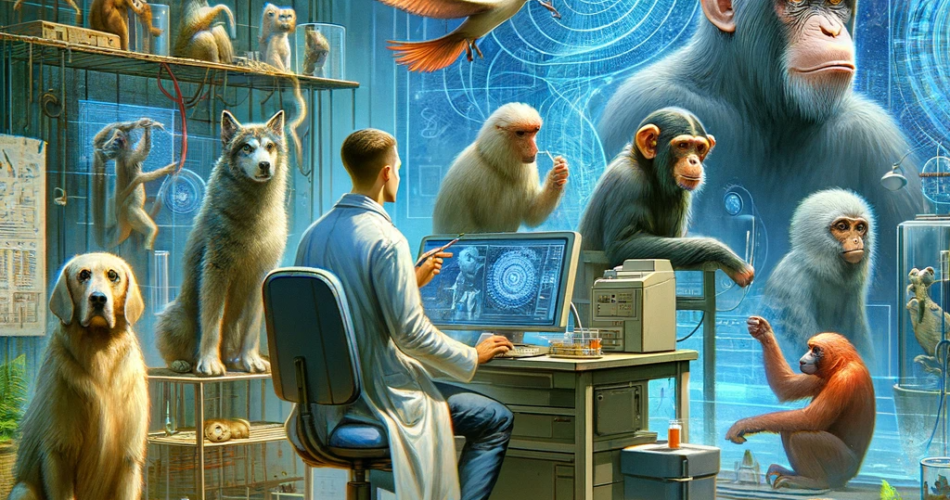Introduction: A Journey into Cognitive Evolution
In the diverse tapestry of life on Earth, the study of animal intelligence opens a window into the profound mysteries of the mind. Brian Hare, an evolutionary anthropologist at Duke University, has embarked on a captivating journey to explore the cognitive abilities of various species, challenging our understanding of intelligence. His work not only illuminates the mental lives of animals but also offers insights into our own cognitive evolution.
Deciphering Animal Intelligence: The Genius of Dogs and Beyond
Understanding Intelligence Through Different Species
Brian Hare’s quest began with a simple fascination: understanding what his childhood pet dog, Oreo, was thinking. This curiosity blossomed into a comprehensive study of animal psychology, with a particular focus on dogs. His book, “The Genius of Dogs: How Dogs Are Smarter Than You Think,” delves into the cognitive capabilities of canines, revealing their sophisticated problem-solving skills and social intelligence.
The Comparative Approach to Cognitive Evolution
Hare’s approach to studying animal intelligence involves comparing different species to understand the evolution of cognition. By observing how various animals, from dogs to chimpanzees, solve problems and interact with their environments, researchers can glean insights into the forces driving cognitive changes across species.
Insights from Evolutionary Anthropology
The Role of Diet in Cognitive Evolution
One of Hare’s significant findings is the correlation between diet and self-control in animals. Species with more complex diets, involving a variety of food sources, tend to exhibit better self-control. This observation suggests that dietary needs may play a crucial role in the evolution of cognitive abilities, perhaps even more than the complexities of social interactions.
Emotional Intelligence in Primates
In comparing chimpanzees and bonobos, two species closely related to humans, Hare has uncovered fascinating differences in emotional intelligence. While chimpanzees exhibit more aggressive behaviors, bonobos are notably empathic and sensitive to the emotions of others. This contrast offers a unique perspective on the evolution of social behaviors and emotional intelligence.
The Interplay of Friendliness and Intelligence
Selection for Friendliness in Evolution
A striking aspect of Hare’s research is the role of friendliness in cognitive evolution. The comparison between dogs and wolves, for instance, reveals how selection for friendliness has led to significant differences in behavior and psychology. This concept is mirrored in the differences between bonobos and chimpanzees, suggesting that friendliness may be a driving force in cognitive evolution.
Cooperation and Tolerance in Cognitive Tasks
In experiments designed to test cooperation, Hare found that tolerance plays a crucial role in an animal’s ability to cooperate. Bonobos, being more tolerant than chimpanzees, excelled in cooperative tasks regardless of their partner, whereas chimpanzees’ ability to cooperate was highly dependent on their relationship with their partner. This finding underscores the importance of social tolerance in cognitive development.
The Canine Connection: Dogs and Human Communication
Dogs: Master Communicators with Humans
Dogs, despite being distantly related to humans, have an exceptional ability to communicate with us, often rivaling that of our closest primate relatives. Hare’s research shows that dogs are adept at understanding human gestures and intentions, a skill that develops early in their lives and remains consistent as they age.
Symbolic Representation in Dogs
In a groundbreaking discovery, Hare found that dogs can use symbolic representation, a key aspect of human language acquisition. Dogs can associate pictures with real objects and retrieve them upon command, demonstrating a level of cognitive sophistication previously thought to be exclusive to humans.
Lessons from Animal Intelligence: Implications for Human Cognition
Redefining Intelligence
Brian Hare’s work pushes the boundaries of how we define intelligence. By studying the cognitive abilities of animals, we gain a broader perspective on what constitutes intelligence. This research not only reveals the diversity of cognitive skills in the animal kingdom but also sheds light on the evolutionary pathways that have shaped human cognition.
Future Directions: Discovering New Forms of Intelligence
Hare envisions a future where research in animal psychology expands to include a wider array of species. This endeavor is poised to uncover new forms of intelligence and cognitive sophistication in animals that have been overlooked or understudied. Such discoveries will deepen our understanding of the mind, both in animals and humans.
Conclusion: A World of Intelligent Beings
In conclusion, Brian Hare’s exploration into the minds of animals offers a fascinating glimpse into the diverse forms of intelligence that exist on our planet. His research not only enhances our understanding of animal cognition but also provides valuable insights into our own mental evolution. As we continue to unravel the secrets of animal minds, we come closer to understanding the essence of intelligence and the interconnectedness of all life.

